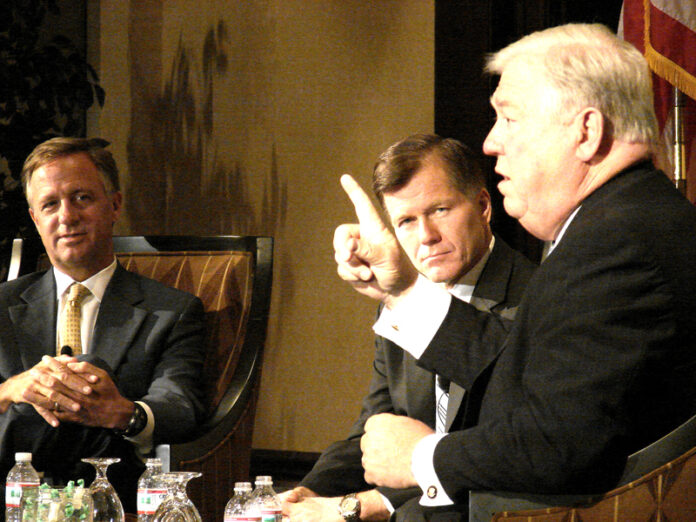
Jay Timmons, president of the National Association of Manufacturers, led a panel of three governors at Monday’s “Manufacturing in the South” conference at the Hotel Roanoke. The stumbling blocks to job creation in the manufacturing sector are the high cost of energy and over-regulation agreed the governors of Virginia, Mississippi and Tennessee.
Governor Haley Barbour of Mississippi said, “We can’t compete on low wages anymore. What we can compete on is the productivity of our workers.”
Governor Bill Haslam of Tennessee said, “gross domestic product was up 25 percent but manufacturing jobs were down 30 percent.” The good news is that employees are more productive but the downside is that results in fewer jobs. That’s our challenge in a nutshell,” he said.
“Capital goes wherever capital wants to go,” said Haslam, taking a poke at Virginia Governor Bob McDonnell when he joked about “interstate theft” of employers. The competition for business between states is fierce.
Education came to the forefront for job creation. “It’s about making education more relevant,” said Haslam. Responding to what would help businesses the most, Haslam said, “removing uncertainty … don’t change the [federal government] rules in midstream.”
Impediments to luring businesses are taxation, litigation and the high corporate tax rate, according to Governor Bob McDonnell. He touted the state’s partnership with Virginia Tech.
McDonnell pointed to tax credits, incentives and revenue sharing to entice business. Reducing the burden on small businesses by cutting the BPOL tax (Business Professional and Occupation and Licensing) would also help.
Taxing revenue as opposed to income deters startups. Eliminating startups from the tax for the first two years would lessen the burden. “If you can give them a little bit of a waiver eventually they’ll be up and running with an ongoing revenue stream,” said McDonnell. Localities like Roanoke City rely on the BPOL tax.
In addition he advocates doing away with the machinery and tool tax by replacing it in a way that isn’t punitive. McDonnell said he’s been looking for a way to preserve “capital formation but still preserve the ability of localities to have a revenue stream.” That’s the policy goal but the answer is still elusive.
“The BPOL tax has been around since the war of 1812,” said McDonnell in response to one of this reporter’s questions to the panel. That started the banter again with Barbour saying of Mississippi, “We never did get our cut of those spoils!.” After they settled down, McDonnell quipped, “See what you started.”
Some questions had no good answer. Potential employees “tethered” to a home they can’t sell hampered employer recruitment.
Energy costs especially hurt rural areas. “Mississippi is the hardest hit by gasoline prices,” said Governor Barbour. Many employees there travel an average of 50 miles to their jobs.
People have a harder time staying in America after graduation. “A kid from India gets a Ph.D. we should staple a green card to his diploma,” said Barbour. It’s a global economy now.
On energy Barbour called the U.S. “the Saudi Arabia for coal.” Governor Haslam said low cost nuclear power was the answer. McDonnell said, “for the foreseeable future oil, natural gas and coal … long-term alternatives make a lot of sense.” McDonnell mentioned the planned offshore wind farms saying, “we’ve got the best winds outside of the U.S. Congress.”
Bringing industry to small rural towns with no infrastructure “just ain’t going to happen,” said Barbour. Locating an assembly plant centrally and spreading out suppliers to small towns was a better option.
McDonnell explained that he turns employers to rural areas like Southside. He promotes the area as having an already trained workforce with reasonable wage rates. Competition from Asia has hurt rural regions like Henry County along with exchange rates and NAFTA.
Outstanding trade agreements are keeping businesses from expanding. “The European Union has shortened the timing for trade agreements, putting the U.S. at a disadvantage,” explained McDonnell.
If President Obama is serious about jobs he needs to “unshackle the entrepreneur by enacting a comprehensive energy policy using all of our resources,” said McDonnell. The governors placed the blame squarely on the federal government.
Government spending is sucking all the money out of the economy,” said Barbour, criticizing the Obama administration. Government subsidizing of energy wasn’t the answer – “let the free market work,” said McDonnell.
“There is a real opportunity as we come out of the global recession to start looking at repatriation of American jobs,” said McDonnell. That requires reducing the corporate tax rate and fast-tracking trade agreements.
The banter back and forth between governors – a sort of “my state is better than your state” amused the audience and provided a welcome interjection on some serious subjects. As a last plug to the audience for Tennessee Haslam said, “did I tell you we have no income tax?”
With what was learned from the conference, “we all go home and compete against one another … that’s the greatness of America,” said McDonnell.
